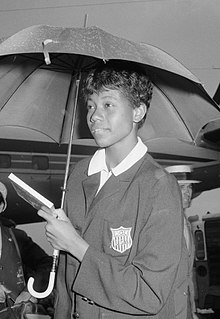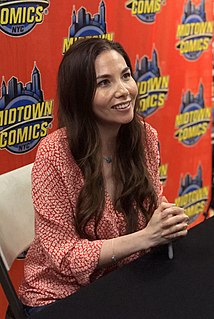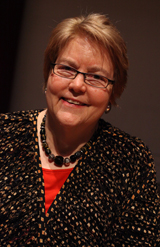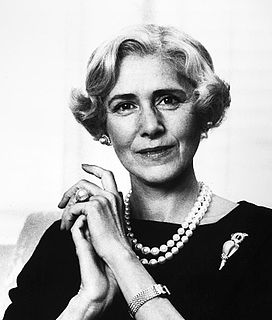Ein Zitat von Wilma Rudolph
Ich kenne schwarze Frauen in Tennessee, die ihr ganzes Leben lang gearbeitet haben, vom zwölften Lebensjahr bis zu ihrem Tod. Diese Frauen hören nicht auf die Rhetorik der Frauenbefreiung, weil sie wissen, dass es sich dabei um nichts anderes als eine Gruppe weißer Frauen handelt, die bestimmte Lebensstile hatten und diese Lebensstile ändern wollen.
Verwandte Zitate
Meine Oma war immer Witwe, solange ich lebte; Mein Großvater starb, bevor ich geboren wurde. Alle Frauen in meiner Straße – es gab vier Häuser in einer Reihe mit allen alten Frauen, die allein lebten und verwitwet waren. Sie hatten alle Kinder, aber sie waren alle verwitwet. Meine Mutter hat mich nicht in die Vorschule geschickt; Ich wusste nicht, dass das so ist. Ich habe einfach den ganzen Tag mit diesen Frauen rumgehangen.
Wir müssen anfangen, die Geschichten schwarzer Frauen zu erzählen, denn ohne sie können wir nicht die Geschichte schwarzer Männer, weißer Männer, weißer Frauen oder sonst jemand in diesem Land erzählen. Die Geschichte schwarzer Frauen ist von entscheidender Bedeutung, denn wer ihre Geschichte nicht kennt, ist dazu verdammt, sie zu wiederholen.
Dessen können Sie sicher sein: Der Herr liebt besonders rechtschaffene Frauen – Frauen, die nicht nur treu, sondern auch voller Glauben sind, Frauen, die optimistisch und fröhlich sind, weil sie wissen, wer sie sind und wohin sie gehen, Frauen, die danach streben, zu leben und zu leben Diene als Frauen Gottes.
Was die Frauenbewegung wirklich verursacht hatte, waren die zusätzlichen Jahre menschlichen Lebens. Um die Jahrhundertwende betrug die Lebenserwartung von Frauen 46; jetzt waren es fast achtzig. Unser tastendes Gefühl, dass wir all diese Jahre nicht allein im Sinne der Mutterschaft leben könnten, war „das Problem, das keinen Namen hatte“. Die Erkenntnis, dass es sich nicht um einen verrückten persönlichen Fehler handelte, sondern um unser gemeinsames Problem als Frauen, hatte es uns ermöglicht, die ersten Schritte zu unternehmen, um unser Leben zu verändern.
Schwarze Haare zu haben ist insofern einzigartig, als schwarze Frauen ihren Stil häufig ändern. Sie können einen Straßenblock in New York City entlanggehen und zehn verschiedene Frisuren sehen, die schwarze Frauen tragen: glatte Locken, kurze Schnitte, Zöpfe – wir decken wirklich die gesamte Bandbreite ab.
Im wirklichen Leben wusste ich, dass das Fandom aus Frauen, farbigen Frauen und Frauen jeden Alters bestand. Aber auf der Verlagsseite der Comics waren es viele weiße, heterosexuelle Männer. Es störte mich oft, die einzigen Frauen bei einem Meeting oder einer Podiumsdiskussion auf einer Comic-Con zu sein. Glücklicherweise hatte ich Mentoren, die sich nicht von meinem Geschlecht blenden ließen und die sagten: „Ja, wir wissen, dass Sie diese Bücher schreiben können.“ Das war nicht bei allen so. Was mir große Hoffnung gibt, ist, dass ich in den acht bis neun Jahren, seit ich angefangen habe, ein enormes Wachstum erlebt habe.
Auch wenn ich selbst nichts tragen würde, glaube ich zu wissen, wie Frauen sich fühlen, wie Frauen aussehen wollen. Ich kann mich wirklich gut in Frauen hineinversetzen, ich verstehe mich sehr gut mit Frauen... Manche Frauen tun das nicht. Ich möchte Frauen stärken und ihnen das Gefühl geben, die beste Version ihrer selbst zu sein.
Ob es von Natur aus weibliche Führungsstile gibt... ist nicht wirklich die richtige Frage. Wichtiger ist die Frage, warum weiblichen Führungskräften im Laufe der Jahre so wenig Aufmerksamkeit geschenkt wurde und warum die Führungsstile, die häufiger von Frauen an den Tag gelegt werden, in diesem kritischen Moment der Geschichte besonders nützlich sind.
...schwarze Frauen schreiben anders als weiße Frauen. Dies ist der deutlichste Unterschied aller Kombinationen von Schwarz und Weiß, Mann und Frau. Es geht nicht so sehr darum, dass Frauen anders schreiben als Männer, sondern darum, dass schwarze Frauen anders schreiben als weiße Frauen. Schwarze Männer schreiben nicht viel anders als weiße Männer.
Wenn man sich das Schreiben der meisten Frauen ansieht, werden Schriftstellerinnen Frauen anders beschreiben als männliche Schriftsteller Frauen. Die Details, die in die Beschreibung einer weiblichen Figur durch eine Autorin einfließen, sind vielleicht etwas wertender. Sie suchen nach bestimmten Dingen, weil sie wissen, was Frauen tun, um auf eine bestimmte Art und Weise auszusehen.






































